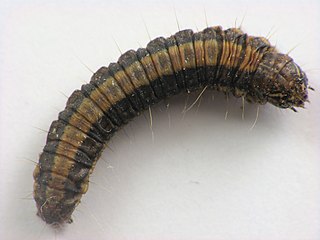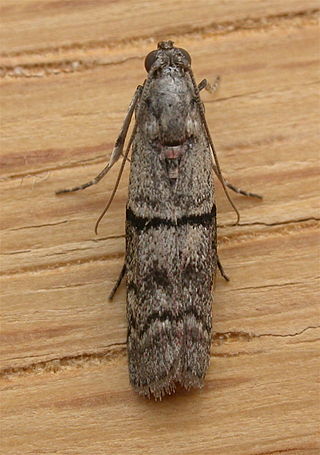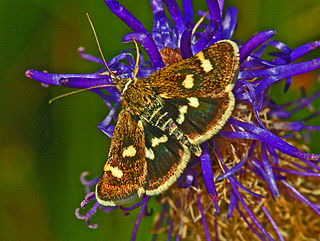
Pyraustinae is a large subfamily of the lepidopteran family Crambidae, the crambid snout moths. It currently includes about 1,280 species Most of them tropical but some found in temperate regions including both North America and Europe.

Crambinae is a large subfamily of the lepidopteran family Crambidae, the crambid snout moths. It currently includes over 1,800 species worldwide. The larvae are root feeders or stem borers, mostly on grasses. A few species are pests of sod grasses, maize, sugar cane, rice, and other Poaceae. The monophyly of this group is supported by the structure of the tympanal organs and the phallus attached medially to the juxta, as well as genetic analyses.

Agriphila is a genus of small moths of the family Crambidae. It was first described by Jacob Hübner in 1825. They are common across temperate Eurasia and in adjacent regions.

Anania is a genus of moths of the family Crambidae described by Jacob Hübner in 1823.

Evergestis is a genus of moths of the family Crambidae described by Jacob Hübner in 1825. A number of species are pests, including the cross-striped cabbageworm, a pest of cole crops such as cabbage.

Udea is a genus of snout moths in the subfamily Spilomelinae of the family Crambidae. The genus was erected by Achille Guenée in 1845. The currently known 215 species are present on all continents except Antarctica. About 41 species are native to Hawaii.

Loxostege is a genus of moths of the family Crambidae.

Pyrausta is a speciose genus of moths of the family Crambidae. The genus was erected by Franz von Paula Schrank in 1802.

The Chrysauginae are a subfamily of snout moths. They are primarily Neotropical and include about 400 described species.

The Epipaschiinae are a subfamily of snout moths. More than 720 species are known today, which are found mainly in the tropics and subtropics. Some occur in temperate regions, but the subfamily is apparently completely absent from Europe, at least as native species. A few Epipaschiinae are crop pests that may occasionally become economically significant.

Homoeosoma is a genus of moths of the family Pyralidae.

Ancylosis is a genus of snout moth. It was described by Philipp Christoph Zeller in 1839, and is known from South Africa, Uzbekistan, Spain, Turkmenistan, Lebanon, Algeria, Tunisia, Russia, Israel, Palestine, Tinos, Australia, Seychelles, Afghanistan, the United States, Iraq, Namibia, Kazakhstan, Iran, Mauritius, Mozambique, Sarepta, Argentina, Sri Lanka, and Aden.

Euzophera is a genus of snout moths. It was described by Philipp Christoph Zeller in 1867.

The Phycitini are a tribe of moths of the family Pyralidae.

Sciota is a genus of snout moths. It was described by George Duryea Hulst in 1888.

Zophodia is a genus of snout moths in the subfamily Phycitinae. It was erected by Jacob Hübner in 1825.

Odontiinae is a subfamily of moths of the family Crambidae. The subfamily was described by Achille Guenée in 1854.















